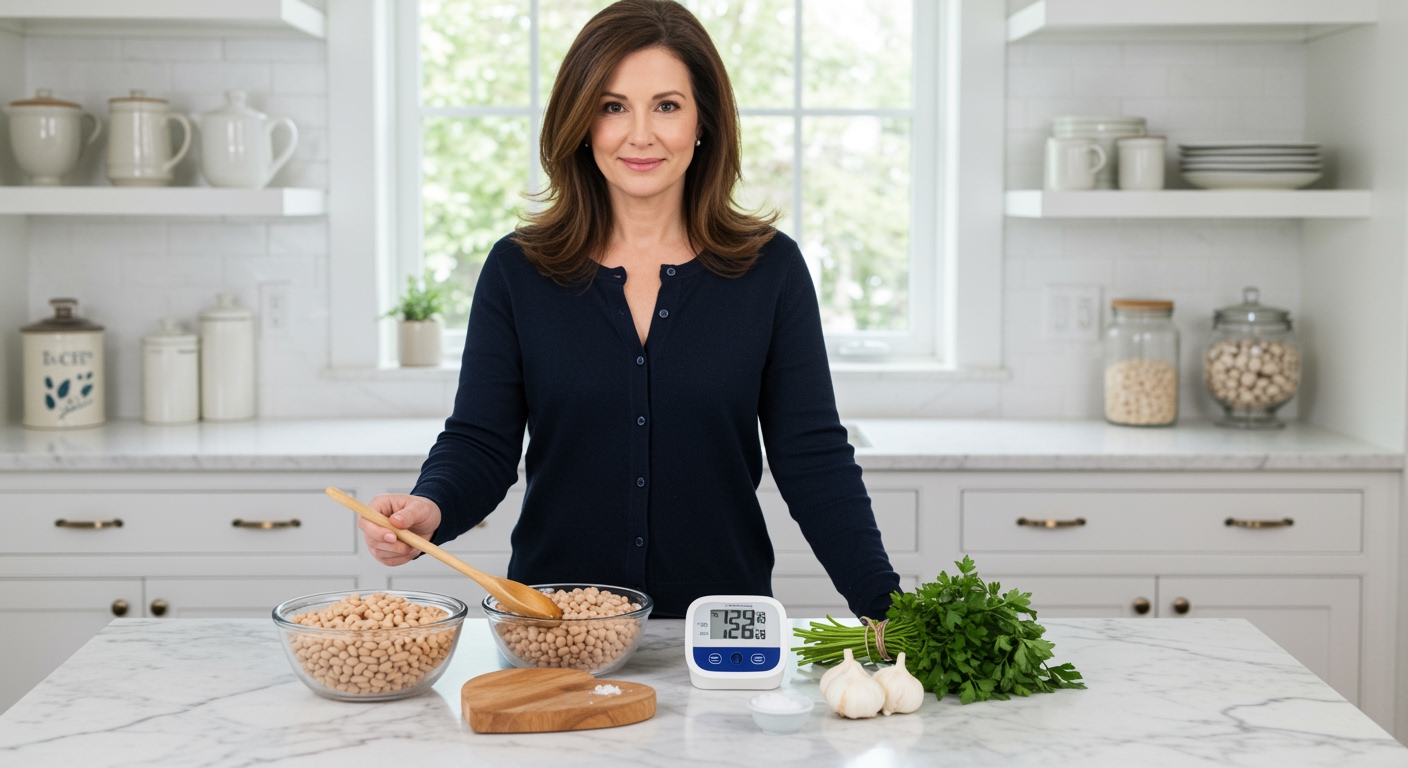✪ Key Takeaway: Navy beans can help lower blood pressure through their high potassium, magnesium, and fiber content.
Introduction
Your doctor just told you that your blood pressure numbers are climbing into dangerous territory.
You might be wondering if simple dietary changes like adding navy beans to your meals could actually make a difference in managing your cardiovascular health.
Hi, I am Abdur, your nutrition coach and today I am going to explain how navy beans can become a powerful ally in your fight against high blood pressure.
What Makes Navy Beans Special for Blood Pressure?
Navy beans contain a unique combination of nutrients that work together to support healthy blood pressure levels.
One cup of cooked navy beans provides approximately 670 milligrams of potassium, which is about 14% of your daily needs.
Potassium acts as a natural vasodilator in your body, helping blood vessels relax and reducing the pressure against arterial walls.
The magnesium content in navy beans also plays a crucial role, with each cup providing about 96 milligrams of this essential mineral.
Magnesium helps regulate calcium channels in your heart and blood vessels, preventing excessive muscle contraction that can elevate blood pressure.
Research shows that people who consume adequate amounts of both potassium and magnesium have significantly lower rates of hypertension compared to those with deficient intakes.
✪ Fact: Navy beans got their name because they were a staple food for the United States Navy in the early 1900s.
How Does Fiber in Navy Beans Affect Blood Pressure?
The soluble fiber in navy beans creates multiple pathways for blood pressure reduction that most people never consider.
Each cup of navy beans contains approximately 19 grams of total fiber, with about one-third being soluble fiber.
Soluble fiber binds with cholesterol in your digestive system, preventing its absorption and helping lower overall cholesterol levels.
Lower cholesterol levels reduce the formation of arterial plaques, which can narrow blood vessels and increase blood pressure over time.
The fiber also slows down glucose absorption, preventing rapid spikes in blood sugar that can trigger inflammatory responses affecting blood vessel health.
Studies indicate that people who consume 25-35 grams of fiber daily experience an average reduction of 2-8 mmHg in both systolic and diastolic blood pressure readings.
✪ Pro Tip: Soak navy beans overnight and cook them with herbs instead of salt to maximize their blood pressure benefits.
Can Navy Beans Replace Blood Pressure Medications?
Navy beans should never be considered a replacement for prescribed blood pressure medications without medical supervision.
However, they can serve as an excellent complementary therapy that may help reduce your dependence on medications over time.
The DASH diet, which emphasizes legumes like navy beans, has been shown to lower blood pressure by an average of 8-14 mmHg in clinical trials.
Many people who consistently include navy beans in their diet report that their doctors have been able to reduce their medication dosages during follow-up appointments.
The key lies in consistent consumption rather than expecting immediate results from occasional bean meals.
Always work with your healthcare provider to monitor your blood pressure readings and make any adjustments to your treatment plan safely.
✪ Note: Blood pressure medications work differently than dietary interventions and both approaches can complement each other effectively.
What Is the Best Way to Eat Navy Beans for Blood Pressure?
The preparation method you choose can significantly impact how effectively navy beans support your cardiovascular health.
Cooking navy beans from their dried form preserves the highest levels of potassium and magnesium compared to canned varieties.
If you use canned navy beans, always rinse them thoroughly to remove excess sodium that manufacturers add during processing.
Aim to consume at least three servings of navy beans per week, with each serving being approximately half a cup of cooked beans.
Combine navy beans with other blood pressure-friendly foods like leafy greens, garlic, and olive oil to create synergistic effects.
Avoid preparing navy beans with high-sodium ingredients like bacon, processed meats, or excessive amounts of salt that can counteract their blood pressure benefits.
✪ Pro Tip: Add navy beans to soups, salads, and stews for easy incorporation into your weekly meal rotation.
Are There Any Side Effects of Eating Navy Beans?
Most people can safely consume navy beans without experiencing any negative side effects related to blood pressure management.
The most common issue people face is digestive discomfort when they suddenly increase their bean intake without gradual introduction.
Start with small portions of about quarter cup per day and gradually increase over two weeks to allow your digestive system to adapt.
People taking certain blood pressure medications should monitor their readings more closely when adding navy beans to their diet, as the combined effect might lower pressure more than expected.
Individuals with kidney disease should consult their healthcare provider before increasing potassium intake through navy beans.
The high fiber content might also interfere with the absorption of certain medications if consumed at the same time, so space out your bean meals and medication timing by at least two hours.
✪ Note: Soaking and cooking navy beans properly reduces compounds that cause digestive discomfort in sensitive individuals.
The Bottom Line
Navy beans offer genuine benefits for blood pressure management through their rich content of potassium, magnesium, and soluble fiber.
Small dietary changes like adding navy beans can create significant health improvements when practiced consistently over time.
I would love to hear about your experience with navy beans or any questions you might have about incorporating them into your blood pressure management plan in the comments below.
References
At NutritionCrown, we use quality and credible sources to ensure our content is accurate and trustworthy. Below are the sources referenced in creating this article:





